'schaffa schaffa Häusle baue'
Pubblicato: 14.02.2021
Iscriviti alla Newsletter
As our first week ended with a snowshoe hike, the second week started with a clean muscle ache (the workouts during quarantine were apparently not as intense as we thought) and at the same time our first work week at UW - University of the Westfjords began... Yes! We also work here, we're not here just for fun... well, maybe partly.
About our workplace:
The University in the Westfjords is definitely not the typical university that most of you might imagine, it is a small institution that has developed further in recent years. There are two master's programs offered, 'Coastal and Marine Management' and 'Coastal Communities and Regional Development', as well as some individual courses and exchange programs (if anyone is interested in a master's degree in these areas, you can apply until April). On average, there are about 40 students here.
Currently, the university has eight employees, whom we will support in various areas over the next 3 months - we have received exciting and challenging projects, especially in marketing and personnel. Three of the employees are originally from Germany, some are from Iceland, and one is from Portugal - it's quite international here! We were already able to participate in meetings in our first week, which are mostly in English. The transition to another language is seamless, you can tell when you suddenly don't understand a word and then join the conversation again after one or two sentences. It's quite crazy when you hear someone speaking English, then briefly Icelandic, and finally, a 'Well, we'll see' comes in.
Something else we like is the fact that EVERYONE uses the informal 'du' form here. In Germany, you often only use 'du' with some of your colleagues, while others are addressed with 'Sie'. But those who are addressed with 'Sie' are sometimes addressed with 'du' by others, and suddenly you might be using 'du' with Mr. Dr. Mustermann or addressing your colleague, with whom you actually have a friendly relationship, with 'Sie'. We definitely prefer the basic 'du' form. Let's hope we don't get too used to it and accidentally use 'du' with our boss/colleague at our next workplace in Germany... One reason why the informal 'du' form may have caught on here could be due to the usual (and in our opinion, quite amusing) naming convention. In Iceland, the last name is formed from the parents' first names. So it consists of the father's or mother's first name with the ending '-son' for sons and '-dottir' for daughters. The son of Joachim/Rainer would then be called Joachimson/Rainerson, and his daughter would be called Joachimsdottir/Rainersdottir (of course, these are fictional names!). The first name is individual, as it is with us.Do you think your village or Germany in general is pretty relaxed when it comes to crime, and trust is actually quite high? Then get ready to hear how we started our weekend and what is 'normal' here in Iceland....
Franziska Rainersdottir and
Franziska Joachimsdottir (Luckily, our fathers don't have the same first name)
Iscriviti alla Newsletter
Risposta (5)
H.
Hallo Ihr lieben, weiter so. Wir verfolgen euren Blog mit Begeisterung 😍Dorothea
Echt spannend, weiter gutes Gelingen. Gibt es Fasching?Franziska
Nicht wirklich ...wär zu schön :DLara
Klingt super spannend, toll geschrieben! Freue mich schon auf den nächsten Beitrag! Und vermisse euch 😩❤️Günter
Hervorragende dokumentation, spannend zu lesen. weiter so, franzi
Rapporti di viaggio Islanda





